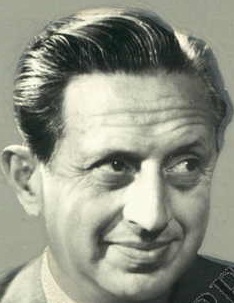Leo Rosten facts for kids
Leo Calvin Rosten (born April 11, 1908 – died February 19, 1997) was an American writer and humorist. He was known for his work in writing stories, screenplays for movies, and for his books about the Yiddish language. He made people laugh with his clever words and observations about life.
Contents
Early Life and Education
Leo Rosten was born in Łódź, which is now part of Poland. His family spoke Yiddish, a language often used by Jewish people. When he was three years old, in 1911, his family moved to the United States. His parents, Samuel and Ida Rosten, were involved in helping workers get fair treatment. They opened a knitting shop in Chicago, where Leo grew up with his younger sister.
In their neighborhood, many families spoke both English and Yiddish. Leo loved books and language from a young age. He started writing his own stories when he was only nine years old. During the Great Depression, a time when many people struggled to find jobs, he taught English to new immigrants at night. These experiences later inspired his most famous books, The Education of H*Y*M*A*N K*A*P*L*A*N and The Return of H*Y*M*A*N K*A*P*L*A*N.
Rosten went to the University of Chicago and the London School of Economics. He studied how governments work, how money works, and how people think. During his time at university, he became friends with people who would become important thinkers in economics.
During World War II, Rosten worked for the U.S. government. He helped share information during the war and later advised on how people think and behave for a research group called the RAND Corporation.
Screenwriter for Movies
Leo Rosten was a successful writer for movies. He wrote the original stories for several films, including The Dark Corner (1946) and Lured (1947), both of which starred the famous actress Lucille Ball. He also helped write the screenplay for Captain Newman, M.D. (1963), which was based on his own novel.
Some of the other movies he worked on include:
- All Through the Night (1942)
- They Got Me Covered (1943)
- The Conspirators (1944)
- The Velvet Touch (1948)
- Sleep, My Love (1948)
- Double Dynamite (1954)
- Mister Cory (1957)
Famous Stories and Books
Leo Rosten is best known for his funny stories about a night-school student named Hyman Kaplan. He wrote these stories using the pen name Leonard Q. Ross. They first appeared in The New Yorker magazine starting in 1935. These stories were later collected into two books: The Education of H*Y*M*A*N K*A*P*L*A*N (1937) and The Return of H*Y*M*A*N K*A*P*L*A*N (1959). The first book was almost a winner for a major U.S. book award in 1938.
He is also very famous for his book The Joys of Yiddish (1968). This book is a guide to the Yiddish language and Jewish culture. It's filled with funny stories and jokes. He followed this with O K*A*P*L*A*N! My K*A*P*L*A*N! (1976), which combined and updated his earlier Kaplan stories, and Hooray for Yiddish! (1982), another humorous book about how Jewish culture influenced the American language. He also wrote Leo Rosten's Treasury of Jewish Quotations.
The writer Fran Lebowitz once said about Rosten: "Funny is funny. Look at Leo Rosten. He's the Jewish James Thurber. The kind of writer who makes you laugh out loud."
Memorable Quotations
Leo Rosten was known for his own wise and funny sayings. Here are a few of them:
- "Truth is stranger than fiction; fiction has to make sense."
- "We see things as we are, not as they are."
- "The purpose of life is not to be happy at all. It is to be useful, to be honorable. It is to be compassionate. It is to matter, to have it make some difference that you lived."
He also famously defined the Yiddish word chutzpah as "that quality enshrined in a man who, having killed his mother and father, throws himself on the mercy of the court because he is an orphan." This shows his unique sense of humor.
Personal Life
On March 30, 1935, Leo Rosten married Priscilla Ann "Pam" Mead. She was also a student at the University of Chicago and was the sister of the famous anthropologist Margaret Mead. Through this marriage, Leo Rosten became related to other creative people, including the artist William Steig.
Leo and Pam had two daughters, Madeline and Margaret, and a son, Philip. They also had six grandchildren. One of his granddaughters, Carrie Rosten, followed in his footsteps and became a writer, even writing a novel for young adults.
Leo Rosten later married Gertrude Zimmerman on January 5, 1960. He passed away in New York City in 1997 at the age of 88. He loved England and often visited there, enjoying its bookshops, theaters, and clubs.
Books by Leo Rosten
Hyman Kaplan Series
- The Education of H*Y*M*A*N K*A*P*L*A*N (1937)
- The Return of H*Y*M*A*N K*A*P*L*A*N (1959)
- O K*A*P*L*A*N! My K*A*P*L*A*N! (1976)
Other Notable Books
- Hollywood: The Movie Colony, the Movie Makers (1941)
- Captain Newman, M.D. (1961)
- The Joys of Yiddish (1968)
- People I Have Loved, Known or Admired (1970)
- Rome Wasn't Burned In a Day: The Mischief of Language (1972)
- Leo Rosten's Treasury of Jewish Quotations (1977)
- Silky. A Detective Story (1979)
- Hooray for Yiddish: A Book About English (1982)
- Leo Rosten's Book of Laughter (1986)
- The Joys of Yinglish (1988)
- Leo Rosten's Carnival of Wit: From Aristotle to Woody Allen (1996)
 | Frances Mary Albrier |
 | Whitney Young |
 | Muhammad Ali |


